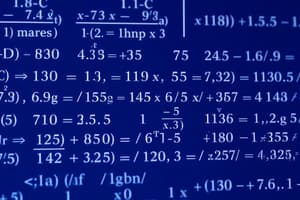Podcast
Questions and Answers
Which logarithms are often used in scientific fields like physics and chemistry?
Which logarithms are often used in scientific fields like physics and chemistry?
- Base 10 logarithms
- Common logarithms
- Exponential logarithms
- Natural logarithms (correct)
What is the base of common logarithms?
What is the base of common logarithms?
- 1
- 2
- 10 (correct)
- e
How can logarithmic equations be solved?
How can logarithmic equations be solved?
- By using the laws of logarithms and properties of equations (correct)
- By memorizing values
- Guessing the solution
- By avoiding using properties of equations
What does the symbol ln represent in mathematics?
What does the symbol ln represent in mathematics?
What is the value of 'e' approximately equal to?
What is the value of 'e' approximately equal to?
Which property of exponents states that \(a^{-n} = \frac{1}{a^n}\) for any non-zero real number \(a\) and any integer \(n\)?
Which property of exponents states that \(a^{-n} = \frac{1}{a^n}\) for any non-zero real number \(a\) and any integer \(n\)?
Which property of logarithms states that the logarithm of a product is equal to the sum of the logarithms of the individual numbers?
Which property of logarithms states that the logarithm of a product is equal to the sum of the logarithms of the individual numbers?
What does the common logarithm with base 10 evaluate to for the number 100?
What does the common logarithm with base 10 evaluate to for the number 100?
For any positive real numbers $a$, $b$, and $n$, which property of logarithms states that the logarithm of a power is equal to the power times the logarithm of the number?
For any positive real numbers $a$, $b$, and $n$, which property of logarithms states that the logarithm of a power is equal to the power times the logarithm of the number?
In the context of logarithms, what does 'lg' typically represent?
In the context of logarithms, what does 'lg' typically represent?
Which property of logarithms deals with the logarithm of a quotient being equal to the difference of the logarithms of the numerator and denominator?
Which property of logarithms deals with the logarithm of a quotient being equal to the difference of the logarithms of the numerator and denominator?
The change of base formula for logarithms involves which positive real numbers?
The change of base formula for logarithms involves which positive real numbers?
Flashcards are hidden until you start studying
Study Notes
Logs and Indices: A Primer on Logarithms and Exponents
Logarithms and indices, often abbreviated as "logs" and "indices," are mathematical tools that help simplify and solve various types of equations and problems. In this article, we'll explore the key aspects of logarithms, common logarithms, logarithmic equations, natural logarithms, and index laws.
Laws of Logarithms
The laws of logarithms, also known as the properties of logarithms, are fundamental to understanding and manipulating logarithms. These properties include:
- Change of base: For any positive real numbers (a), (b), and (x), where (b\neq 1), we have that (\log_b a = \frac{\log_c a}{\log_c b}).
- Logarithm of a product: For any positive real numbers (a), (b), and (c), (\log_b (ac) = \log_b a + \log_b c).
- Logarithm of a quotient: For any positive real numbers (a), (b), and (c), where (c\neq 0), (\log_b \frac{a}{c} = \log_b a - \log_b c).
- Logarithm of a power: For any positive real numbers (a), (b), and (n), (\log_b a^n = n \log_b a).
- Change of base formula: For any positive real numbers (a), (b), and (n), (\log_a b = \frac{\log_c b}{\log_c a}), where (c) is any positive real number not equal to 1.
Common Logarithms
Common logarithms, also known as base-10 logarithms, are logarithms with base 10. These logarithms are often denoted using the symbol (log) or (lg). For example, (log(100) \approx 2), since (10^2 = 100). Common logarithms are widely used in everyday calculations because our number system, base 10, is well-suited for arithmetic operations.
Logarithmic Equations
Logarithmic equations are equations that contain logarithms. To solve logarithmic equations, we can make use of the laws of logarithms and the properties of equations.
- Rewrite the logarithm as an exponent using the definition of logarithms: (b^x = a \Leftrightarrow x = \log_b a).
- Use the properties of logarithms to move logarithms inside or outside of other mathematical operations.
- Isolate the variable by manipulating the equation to have only one logarithm with the variable inside.
Natural Logarithms
Natural logarithms, or base-e logarithms, are logarithms with base (e), where (e \approx 2.71828). Natural logarithms are denoted using the symbol (\ln). Natural logarithms are often used in scientific fields, such as physics and chemistry, because they are more suitable for modeling certain natural phenomena.
Index Laws
Index laws are the properties of exponents that help simplify and manipulate expressions containing exponents. These properties include:
- Product rule: For any non-negative real numbers (a), (b), and (n), (a^n b^n = (ab)^n).
- Quotient rule: For any positive real numbers (a) and (b), and any non-negative real number (n), (\frac{a^n}{b^n} = (\frac{a}{b})^n).
- Power of a power rule: For any non-negative real numbers (a), (b), and (n), ((a^b)^n = a^{bn}).
- Zero power rule: For any non-zero real number (a), (a^0 = 1).
- Negative integer rule: For any non-zero real number (a), and any integer (n), (a^{-n} = \frac{1}{a^n}).
By understanding these laws, we can solve complex equations and simplify expressions involving logarithms and indices. These mathematical tools underpin many fields of study and provide the foundation for advanced topics in algebra, calculus, and other areas of mathematics.
Studying That Suits You
Use AI to generate personalized quizzes and flashcards to suit your learning preferences.




